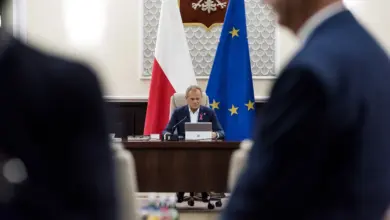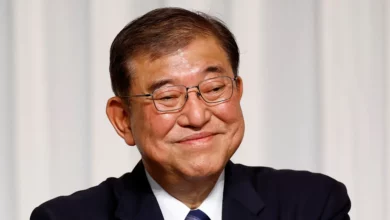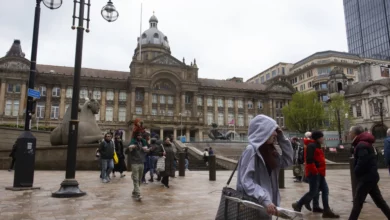As dark clouds of smoke billowed out to sea, a blazing red sun set to end a day of street battles with no telling what was to come. On 28 January in Alexandria almost every police station in the city was on fire, state security trucks were upside down and ablaze and every uniformed element of the Interior Ministry had disappeared. The atmosphere was rich with a sense of triumph and an equal, if not overpowering, feeling of dread.
But Alexandrians mobilized immediately. Come nightfall the waterfront was lined with young men, each one bearing a patch on his shoulder that read Lagna Shaabeyya (popular committee). Their responsibilities that night were to help anyone on the street get home and protect the library of Alexandria and other public institutions from thugs. Some even guarded police stations.
Come morning, a flier was distributed mobilizing more citizens to form committees for the protection of the revolution. It read: “The police has withdrawn as if its role is limited to the suppression of protests….we must form popular committees everywhere to protect public and private properties and support the demands of this uprising….”
By the end of the day the popular committees had “branches” in every neighborhood, a central unit near Qa’ed Ibrahim mosque and a list of phone numbers that the army distributed to anyone who came to their tanks with queries or complaints.
These popular committees evolved in most of Egypt’s cities almost instantly. Some developed sub-committees responsible for economic support, medical services and public safety. Born out of a moment of chaos and fear, they proved themselves to be capable of self-organization in the days that followed. But most importantly, they proved to people that the end of “government” did not mean the end of the world.
As the months wore on, and the communities’ needs shifted from short-term security to long-term policy, the committees spontaneously became involved in campaigns to discuss the referendum on the constitution in March. Some even monitored ballot boxes to pre-empt fraud, which was wide-spread under the newly-unseated regime. At venues like the Development Support Centre in Dokki and the Socialist Studies Centre in Giza, the committees have found spaces to network, exchange information and work collectively.
When the police force slowly returned to its stations, the popular committees in Boulac, a working-class district in Cairo, monitored their progress. When a woman was harassed in the marketplace by an officer, committee members reported the incident to one of his superiors demanding an apology – which was ignored. Within minutes, 1,000 local residents sat quietly outside the station, promising another few thousand of their people would show up if their request was not fulfilled. The officer acquiesced on the spot.
In Al-Qanater, a rural community just north of Cairo, a committee has been working to involve youth, whose lives remain a world apart from their urban counterparts, in electoral politics. In Hadayeq El Qubba, another committee launched a campaign to help people understand the difference between liberal, socialist and Islamist approaches to economic issues because, as one member told me, the community was “tired of being swayed by this or that intellectual without knowing what’s in it for the people.” In El Saf, popular conferences have addressed how governorate boundaries have been redrawn several times over the last few years without community input, debating how planning can take place with more community participation. In Dokki a new campaign called “Monitoring Prevents Corruption” has been launched to monitor parliamentary candidates.
It’s in the work of these groups that the revolution continues: From representing community demands to engaging local residents to hold their government accountable, these committees are making politics relevant to people's everyday lives.
For most committees, politics is no longer “out there” in a remote sphere from which they feel marginalized; politics is at home. For the broader society, popular committees are an opportunity to communicate with once-invisible citizens.
At one meeting, I met Marwa, clad in a black niqab, who spoke of how she worked with her committee to spread liberal values in the villages of Sohag. In another, Peter from Shubra described how his main initiative was to encourage Coptic youth to become more active outside the Church, shifting the locus of their identity from religion to community. At a recent meeting in Imbaba, I met the father of a young resident who was killed during the uprising. “The revolution is not in Tahrir,” he announced. “How many people died in Tahrir compared to all of our neighborhoods? The revolution is here [in Imbaba] and we must continue fighting for it.”
And the revolution is indeed here. The popular committees of Imbaba, Kerdasa, Matareyya, Dar El Salam, and other areas work hard to ensure the new power balance in Egypt serves them, not just the authorities. Their struggles are a reminder of how fragile this revolution is – if those responsible for killing their loved ones are not tried, the justice system will have failed us all.
In this surge of grassroots activism lie potential forms for popular governance. The committees not only teach us about the specific issues facing each neighborhood, but together they can teach us something about how political representation, accountability and local governance work on the ground.
This revolution was marked by spontaneity and an impressive synchrony between people. The popular committees were born out of that that moment. They formed to serve their communities, and evolved with a stronger sense of ownership and belonging to “local communities”. Many eyes will remain fixated on official procedures and politics from above in the coming period. But as communities we can also start practicing politics from home to create visions and structures that start with the people and serve us all.
Alia Mossallam is a PhD student at the London School of Economics and Political Science.




